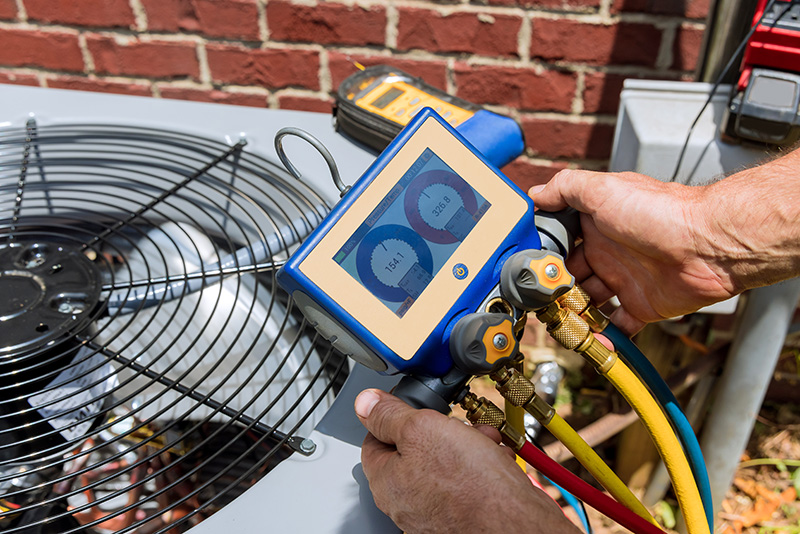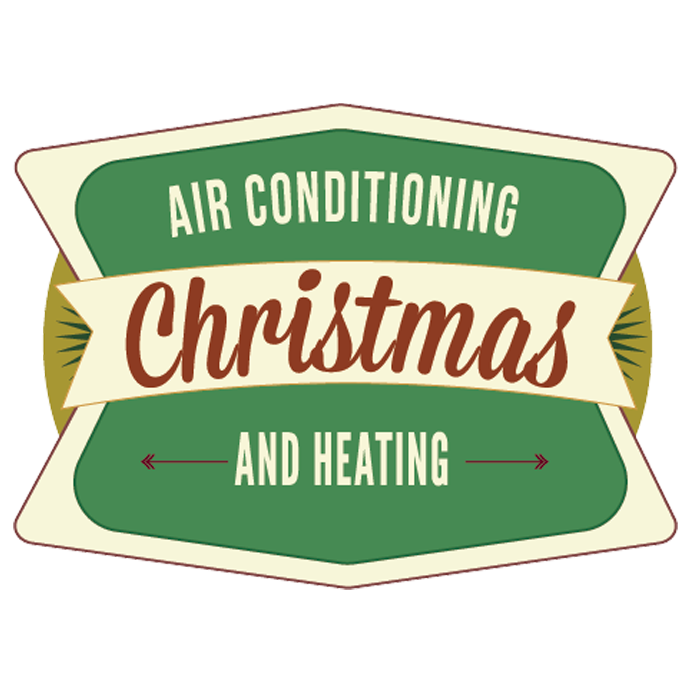Understanding HVAC System Types for Homes and Businesses
Heating, ventilation, and air conditioning (HVAC) systems control indoor temperature, humidity, and air quality. Choosing the right HVAC system type depends on building size, energy efficiency needs, and budget. Selecting the right system for a home or commercial property ensures comfort and efficiency. Christmas Air Conditioning, and Plumbing helps customers choose, install, and maintain HVAC systems to meet their needs.

What Is an HVAC System?
An HVAC system combines heating, cooling, and ventilation components that regulate indoor climate. These systems vary in design and function and offer different solutions for residential and commercial buildings.
How HVAC Systems Work
HVAC systems use heating and cooling mechanisms to maintain comfortable indoor temperatures. A heating unit, such as a furnace or heat pump, provides warmth, while an air conditioning unit cools the space. Ventilation ensures proper airflow by exchanging stale indoor air with fresh outdoor air. Some systems use ducts to distribute conditioned air, while others operate without ductwork.
Benefits of a Well-Designed HVAC System
A properly designed HVAC system improves energy efficiency, reduces utility costs, and enhances indoor air quality. Effective heating and cooling contribute to year-round comfort, while proper ventilation helps prevent mold and airborne contaminants. Regular maintenance extends the system’s lifespan and ensures consistent performance. Christmas Air provides expert guidance on selecting and maintaining HVAC systems for optimal efficiency.
Common HVAC System Types
Several HVAC system types are available, each designed to meet different heating, cooling, and ventilation needs. Understanding the differences helps homeowners and businesses choose the best system for their space.
Split HVAC Systems
A split HVAC system is the most common type used in residential and commercial buildings. It consists of two main components: an indoor unit (evaporator coil and air handler) and an outdoor unit (condenser and compressor).
- Features and Benefits: Split systems provide efficient cooling and heating with separate components. They allow for zoning control and work well in different climate conditions.
- Best Uses for Split Systems: Split systems are ideal for homes and buildings with existing ductwork, offering a cost-effective and widely available solution.
Hybrid Split HVAC Systems
A hybrid split HVAC system operates similarly to a standard split system but includes an energy-efficient heat pump. The system can switch between gas and electric power based on temperature and energy costs.
- Energy Efficiency and Cost Savings: Hybrid systems reduce energy consumption by using electricity in mild weather and gas in colder temperatures.
- How Hybrid Systems Work: The heat pump provides cooling and heating, while a backup gas furnace ensures efficiency in extreme conditions.
Ductless Mini-Split HVAC Systems
A ductless mini-split system provides heating and cooling without requiring ductwork. It comprises an outdoor unit connected to one or more indoor air handlers.
- Advantages of a Ductless System: Offers flexibility for zoning, easy installation, and improved energy efficiency.
- Ideal Applications for Mini-Splits: They are suitable for homes without existing ductwork, room additions, and commercial spaces needing individualized climate control.

Packaged HVAC Systems
A packaged HVAC combines all heating and cooling components into a single outdoor unit, often installed on rooftops or building exteriors.
- How Packaged Units Differ from Split Systems: Unlike split systems, packaged units contain all components in one housing, saving indoor space.
- Best Use Cases for Packaged Systems: These are common in commercial or residential buildings with limited indoor space for HVAC equipment.
Geothermal HVAC Systems
A geothermal HVAC system uses underground heat to provide energy-efficient heating and cooling. It transfers heat between the earth and a building through a network of buried pipes.
- How Geothermal Heating and Cooling Works: The system absorbs heat from the ground in winter and releases heat into the ground in summer.
- The Long-Term Benefits of Geothermal Systems include significant energy savings, a longer lifespan, and a more minor environmental impact than traditional HVAC systems.
Choosing the Right HVAC System for Your Needs
Selecting the right HVAC system type depends on building size, climate, energy efficiency, and budget. Before deciding, homeowners and businesses must consider long-term performance, maintenance costs, and installation requirements.
Residential HVAC Considerations
Homeowners should choose an HVAC system that fits the size of their home and provides consistent heating and cooling. Factors to consider include:
- Energy Efficiency: High SEER (Seasonal Energy Efficiency Ratio) and AFUE (Annual Fuel Utilization Efficiency) ratings indicate better efficiency.
- Ductwork Availability: Homes without existing ductwork may benefit from ductless mini-splits.
- Zoning Needs: Some homes require multi-zone systems to provide customized temperature control.
Commercial HVAC System Requirements
Commercial buildings have different HVAC demands than residential properties. Larger spaces often require more powerful systems, advanced ventilation, and zoning capabilities. Key considerations include:
- Building Size and Usage: Larger buildings need centralized or packaged systems for efficient heating and cooling.
- Air Quality and Ventilation: Proper ventilation ensures indoor air quality standards compliance.
- Scalability: Businesses with future expansion plans should consider modular HVAC solutions.
Factors to Consider: Energy Efficiency, Size, and Cost
When choosing an HVAC system, both residential and commercial customers must weigh several factors:
- Energy Efficiency: High-efficiency units lower utility costs and reduce environmental impact.
- System Size: An improperly sized unit can lead to inefficiency, higher costs, and uneven temperature control.
- Installation and Maintenance Costs: Some systems have higher upfront costs but save money over time through energy efficiency and low maintenance.
Christmas Air Conditioning, and Plumbing provides expert consultation to help customers select the best HVAC system.
HVAC System Installation, Repairs, and Maintenance
Proper installation, regular maintenance, and timely repairs ensure that HVAC systems operate efficiently and last longer. Professional service helps prevent costly breakdowns and improves system performance.
Professional Installation for Maximum Efficiency
A professionally installed HVAC system operates more efficiently and lasts longer. Installation factors include:
- Correct Sizing and Placement: Ensuring the system matches the building’s heating and cooling needs.
- Ductwork Inspection: Check for leaks and ensure proper airflow.
- Manufacturer Guidelines: Following recommended installation procedures to maintain warranty coverage.
Common HVAC Repairs and Troubleshooting
Even with proper maintenance, HVAC systems may require repairs. Common issues include:
- Refrigerant Leaks: Low refrigerant levels reduce cooling efficiency.
- Thermostat Malfunctions: Inaccurate temperature readings lead to uneven heating or cooling.
- Airflow Problems: Blocked ducts or dirty filters restrict air circulation.
- Mechanical Failures: Worn-out motors, belts, and compressors affect system performance.
Routine Maintenance for Long-Term Performance
Regular maintenance extends the life of an HVAC system and keeps it running efficiently. Essential maintenance tasks include:
- Filter Replacement: Changing air filters regularly to improve airflow and air quality.
- Coil Cleaning: Removing dirt buildup from evaporator and condenser coils.
- Duct Inspection: Checking for leaks or blockages in ductwork.
- Seasonal Tune-Ups: Ensuring the system is prepared for seasonal temperature changes.
Christmas Air offers comprehensive HVAC maintenance plans to help customers maintain their systems.
Let Christmas Air Help You Find the Right HVAC System
Choosing the right HVAC system type is essential for comfort, efficiency, and long-term savings. Christmas Air Conditioning, and Plumbing provides expert guidance on selecting, installing, and maintaining HVAC systems. Their team offers professional consultation for homeowners and businesses, helping customers choose the best system based on property size, energy efficiency, and budget. Expert installation and reliable repairs ensure optimal performance and long-term functionality. Whether upgrading an existing system or installing a new one, Christmas Air delivers quality service tailored to your needs.
